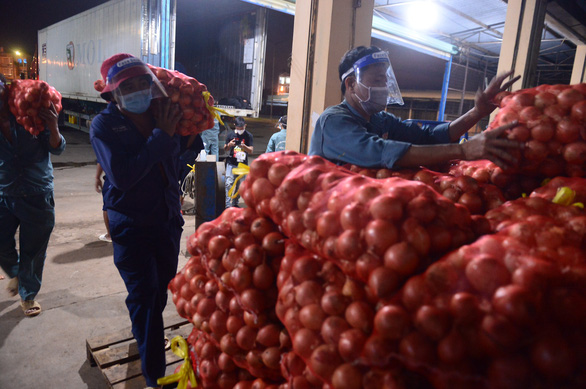Many cheap Chinese vegetable and fruit products have been imported massively into Vietnam and overwhelmed the domestic market, with some of them being fraudulently labeled as Vietnamese items to help buyers earn big profits, a reportage by Tuoi Tre (Youth) newspaper has shown.
Such low-priced imports, which have dominated both physical and virtual markets in Vietnam, include those of high demand during the coming Tet, or Lunar New Year, holiday, such as dried fruits and fruit jams, and vegetable products, like carrots, potatoes and onions.
Many e-commerce websites have recently drawn attention from consumers by offering ‘dried green grapes originated from Ninh Thuan,’ a south-central Vietnamese province, for VND50,000 - 80,000 (US$2.2 - 3.5) per kilogram, much cheaper than normal market prices of the famous specialty.
Tuoi Tre reporters contacted a Hanoi-based trader via Facebook ads on ‘Ninh Thuan raisin’ and was offered such products for VND60,000-70,000 ($2.6 - 3) per kilogram.
“I assure you that my raisins are genuine Ninh Thuan ones. They are processed from seedless grapes and have trademarks and labels,” the seller said.
Meanwhile, Pham Huu Nhat Kha, a grape grower in Ninh Thuan, commented that almost all grapes grown in the province are seedy varieties and taste a bit sour.
Meanwhile, the dried green grapes advertised online are seedless ones with a very sweet taste and thinner skin, which are typical characteristics of Chinese green grapes.
Tran Ai Nhu, representing Ninh Thuan-based Ba Moi Company, told Tuoi Tre that local farmers sell fresh green grapes for VND60,000 - 70,000 per kilogram depending on varieties, with the minimum price being more than VND30,000 ($1.3) per kilogram.
 |
| A computer screen shows raisin products of unknown origin put up for sale on a website. Photo: Quang Dinh / Tuoi Tre |
Usually, one kilogram of dried grapes is processed from five to eight kilograms of fresh grapes, the representative said.
“Therefore, genuine Ninh Thuan raisins are often sold for at least VND200,000 ($8.7) per kilogram, while dried seedless grapes advertised as Ninh Thuan raisins are very likely to be Chinese imports,” Nhu concluded.
Likewise, many kiwi jam products are offering for VND60,000 to VND120,000 ($5.2) per kilogram, with the sellers assuring that their products have been made from Vietnamese kiwi.
However, some dealers told Tuoi Tre reporters that this fruit cannot be grown in the Southeast Asian country.
In order to earn high profits, traders have falsely claimed Chinese fruit products not only as Vietnamese ones but also as those originated from the U.S. or Australia.
Along with fruit products, many vegetable items of Chinese origin have been falsely claimed as from Da Lat, a temperate climate city famous for vegetable cultivation in Vietnam’s Central Highlands province of Lam Dong.
A trader of vegetables in Ho Chi Minh City’s Binh Thanh District admitted that almost of the carrots, onions and potatoes at his shop were of Chinese origin, but he still introduced them to buyers as Da Lat vegetables for higher profits.
“I have to advertise my vegetables as Da Lat products since many consumers are usually afraid of Chinese commodities,” the shop’s owner, called himself Dat, told Tuoi Tre reporters.
According to a representative of Hoc Mon wholesale market in Ho Chi Minh City, dozens of cheap Chinese farming commodities have been sent to this market in large quantities, such as purple cabbages, cauliflowers, green broccolis, carrots, yellow potatoes, and garlics.
Similarly, Thu Duc agricultural wholesale market has also seen a huge inflow of low-priced Chinese fruits such as persimmons, pears, yellow tangerines and red tangerines, seedless grapes.
As prices of many domestic agricultural products, especially those from Da Lat, usually pick up during the year-end, many traders of cheap Chinese farm produce have falsely labeled their products as Da Lat items to attract buyers, said Luu Duc Lap, director of Lam Dong-based Agri Duc Tien Co., Ltd.
“Many Chinese farming products, like carrots, potatoes and cabbages, are priced at about VND10,000 ($0.43) lower than the same domestic products for each kilogram. Therefore, some dishonest traders have cheated clients for huge illegitimate profits,” Lap said.
A representative of Shopee, an e-commerce platform, said that it has applied stricter control measures to suppliers while expanding customers’ interests and rights such as allowing them to return purchased items or giving them satisfactory compensation.
A Lazada representative also said that it has tightened regulations on the origin and quality of food and cosmetics sold on the platform, but many sellers have evaded the regulations by registering false information about products and their categories.
As online shopping has recently increased sharply due to the COVID-19 epidemic, especially during the pre-Tet period, market monitors could detect and handle a part of violations only, despite control activities having been strengthened, said Tran Huu Linh, general director of the General Department of Market Surveillance.
“Next year, we will present to the government an anti-counterfeiting campaign in the e-commerce environment, with focus put on enhancing responsibilities of online trading floors and their suppliers to better product quality control,” Linh said.
Like us on Facebook or follow us on Twitter to get the latest news about Vietnam!



















































